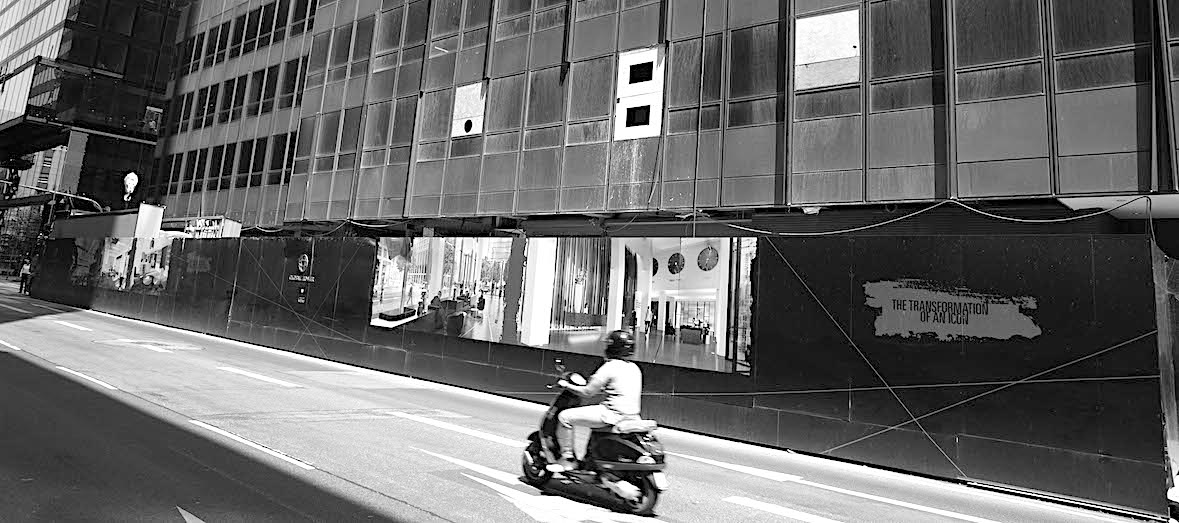INSIGHTS FROM THE 2019 AFIRE EUROPEAN CONFERENCE
“It has been said that arguing against globalization is like arguing against the laws of gravity.”
Kofi Annan
Real estate is often considered a “local” business. To succeed, however, real estate professionals need to understand not only what’s going on down the street, but what’s happening around the globe. And, perhaps more importantly, they are increasingly being called upon to improve our communities – and our world. That message came through during the recent AFIRE European Conference in Frankfurt, Germany.
“When preparing for this meeting I came across Mr. Annan’s observation that an argument against globalization is like arguing against the laws of gravity,” said Gunnar Branson, AFIRE CEO. “We are living in a very global world and we have come to realize that every time someone does something, it affects everyone else. As such, real estate professionals need to pursue investment opportunities that not only result in positive financial returns but simultaneously make this world a better place. It’s a responsibility and opportunity that everyone here should embrace.”
—
UNDERSTANDING THE GEOPOLITICAL OUTLOOK
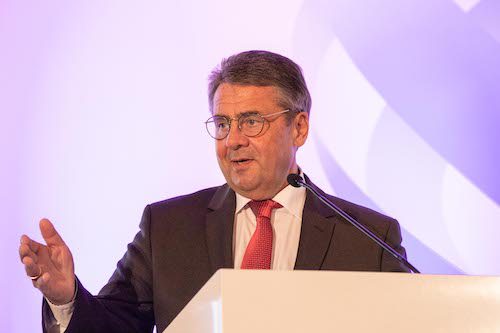
The first step in succeeding as an investor and making the world a better place involves understanding it. In his keynote address, Sigmar Gabriel, who serves as Germany’s Minister for Foreign Affairs from 2017 to 2018 and Vice-Chancellor of Germany from 2013 to 2018, offered his insights into the current state of geopolitical affairs in Europe and across the globe.
“Today, the world sees Europe as the last geopolitical vegetarian in a world full of carnivores,” said Gabriel, voicing a number of concerns related to the possible withdrawal of the United Kingdom from the European Union (EU). “If Britain leaves the Union, they will see us as vegans. This might be healthy in our private life, but internationally it is dangerous to be the only vegan among carnivores.”
“The major powers in the world, they are testing us. If Britain will leave [the EU] …we will be seen as weak. There’s plenty of work to do within the European Union, but at the same time, the geopolitical landscape is changing so quickly and so radically that even a far more united European Union would find it hard to remain steadfast.
“For the new American administration, Europe seems to be in conspiracy against the American interests. This ideology is worrying me much more than the trade conflict itself, but Europe will only be able to uphold its position in the world – its values and its interests – if we stand closer together than we have done.”
While Gabriel offered his perspective on the tenuous state of affairs in the EU, he also recognized that, regardless of how the Brexit scenario unfolds, real estate investors need to increasingly make business decisions with an understanding of what’s happening in the global economy.
“Even if we succeed in creating free and open markets with a level playing field, what remains unanswered is what we actually do at a globalized and data-driven economy to ensure that there is not only free but also fair and socially-responsible trade,” Gabriel said. “How do we prevent the emergence of permanent winners and permanent losers? How does a fair world economy come about?
“Politically, we are in a competition between the liberal democracies and the authoritarian offerings in the world. This, too, has a lot to do with economic and social success or failure. Our own liberal democracy is actually capable of being more efficient, more productive, more socially secure, and more politically stable than authoritarian regimes.”

While Gabriel provided his take on the changing world, a panel of industry experts came together to offer some perspective on the US real estate market. To open the session, moderator Byron Carlock, National Partner/Real Estate Practice Leader at PwC, pointed out that the current economic expansion was on track to hit a record-breaking 121 months in July 2019.
“I’m guessing that your portfolios are very healthy,” Carlock said. “Supply and demand is in good shape, and there are only a few soft spots in retail, upper-end luxury, and certain cities perhaps that are struggling. But generally, our industry is in very fine shape.”
Of course, this expansion is prompting many to ask “whether or not a shoe is about to drop, or a hammer is about to fall,” Carlock said, as he asked panel participants to prognosticate on the future of the US economy.
While the panelists predicted that the economy should stay strong for the foreseeable future, a slow-down remains a concern. For example, Zeb Bradford, Chief Investment Officer at Metzler North America, noted: “None of the economists see any downturn over the next two to three years. There may be some moderation of growth but it looks to be a very benign environment. I’m sure those economists didn’t call it back in 2006 either, though.”
Christoph Donner, CEO at Allianz Real Estate of America, said that a slowdown is hard to predict, but largely inevitable. “The question is to what extent and at what point a recession will hit. It might be 18 months out or occur at another time, but at some point, it’s going to happen,” Donner said, adding, “There is risk in certain property types and the portfolio returns are going to be challenged.”
CREATING OUTSIDE THE BOX
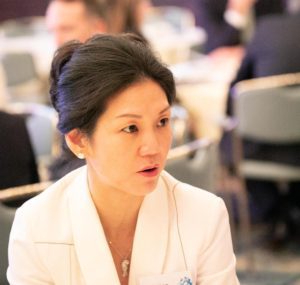
While real estate investors are not able to control the ups and downs of the economy, a dose of out-of-the-box thinking can go a long way as they strive to make investments that are both financially and socially sound.
Case-in-point: AFIRE member Gaw Capital Partners invested in several graffiti-laden warehouses on the fringe of Chinatown, a distressed Los Angeles neighborhood. The idea was not to merely create another startup district, but to enhance opportunities for social connectivity by renting spaces to music-focused companies that could create a neighborhood and gathering place for musicians and music lovers.
To create this music mecca, Gaw Capital rented warehouse space to a well-known talent agency that could explore uses of the space and form a creative nucleus for the emerging neighborhood. It was an ideal opportunity for the agency, because – like many cultural industry leaders – there was more interest in contributing to a unique, local identity rather than merely occupying a new, nondescript space in a shiny building. Gaw Capital leased additional spaces in the neighborhood for live music events, as well as restaurants operated by internationally renowned chefs, ultimately contributing to the growing sense of culture at the north end of LA’s Chinatown area. Through its application of creative thinking, Gaw Capital is collecting higher rents while also marshaling resources that are transforming a dilapidated neighborhood into a desirable destination.
INVESTING IN A BETTER WORLD
The idea of making the world a better place through responsible real estate investments and developments sits at the heart of environmental, social, and governance (ESG) efforts. Making the right decisions is becoming non-negotiable in today’s business world.
“As of next April [2020], you will not be able to legally occupy a building in London that has a low energy efficiency rating. In the United States, almost every major building has benchmarking requirements that require you to publicly disclose your energy consumption at the building. Why does this matter?” asked Green Generation CEO Bradford Dockser during an ESG workshop that he hosted. “A lot of people think about sustainability as a nice-to-have. But if you are a good investor, you will think about sustainability in terms of driving the value of your assets.”
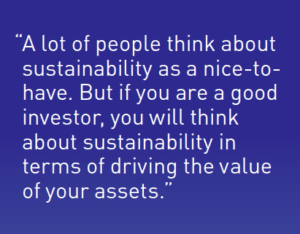
Environmentally responsible investments can result in hard savings via reductions in electricity, water, and gas. “It’s [also] possible to reduce repairs and maintenance, which will allow people to spend less time fixing things and more time responding to the various stakeholders in the building,” Dockser said. “And if you go chemical-free in your water treatment system, you should be able to realize some form of insurance savings. If you put solar film on your windows, you will change the characteristics of your building construction from an insurance point of view. Even though you’ve done it for an energy reason, you’ve also reduced your insurance.”
While there are many bottom-line benefits for investors, it’s also important to think about the advantages that ESG-friendly investments can bring to communities.
“There are so many external stakeholders, it’s hard to measure all the benefits,” said one meeting participant. “You need to go beyond the value to the investors and think about what you are doing in a community, what are you doing for the world long term. The problem is that those things aren’t as easy to measure.”
SHARING THE RIDE
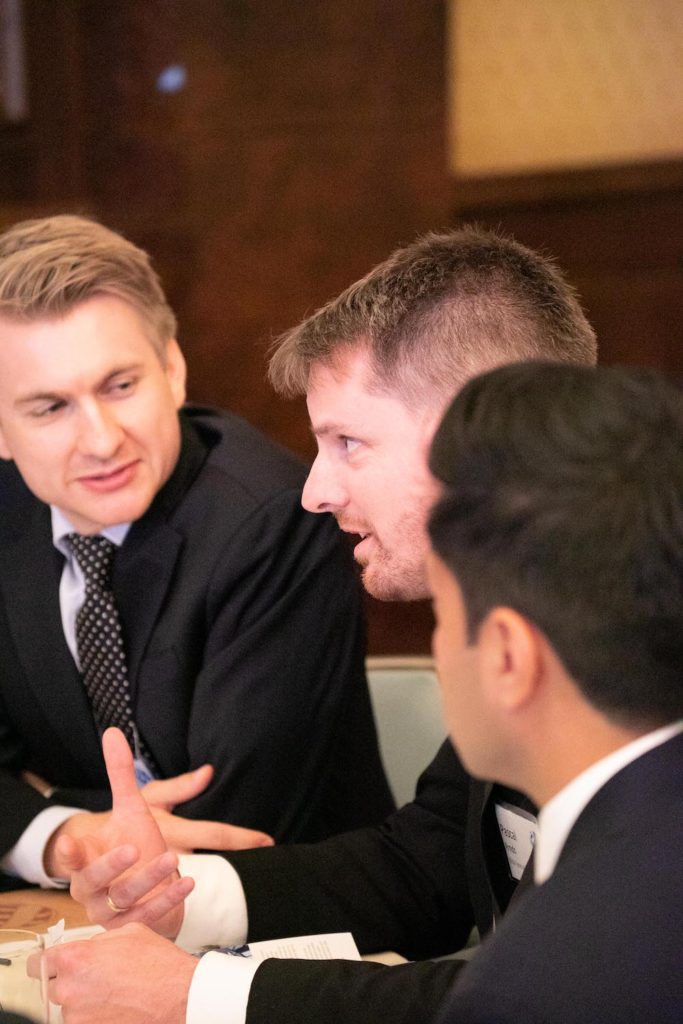
Real estate investors need to determine how they can change the world for the better through responsible ESG investment, while considering positive ways to deploy new, more equitable technologies – and how these advancements could lead to new real estate requirements. Uber and other ride sharing companies, for example, are turning the transportation industry on its ear – and that’s resulting a variety of considerations for real estate investors.
To start, these ride-sharing companies could reduce the need for cars, which will lead to a reduction in the need for parking. “In the US, we have 80% of people driving their own cars when they are traveling nationally,” said Andreas van De Castel, Head of Business Development Germany, Uber.
“There are some laws that actually require developers to build a certain amount of parking, together with new buildings. And that is quite literally cementing the way that we are into car ownership and moving around with cars. The need for parking also creates more of a need for driving, because we create environments that are not very friendly for walking or other transportation means. So, it’s a vicious circle that we try to break through ride sharing,” van De Castel said. “Uber can help. Uber is actually able to make it easier to share individual cars with more people, and therefore, it’s easier to have less cars on the road and less demand for individual car ownership moving forward.”
Uber is also working to reduce the need for cars through programs such as Jump, an electric bike sharing initiative; make transportation safer through the use of autonomous vehicles; and save the environment through initiatives such as UberGREEN. Such offerings could have an effect on the real estate industry. “We need to be prepared for electric vehicles. We need charging infrastructure as the cities of the future are developed,” said Andrew Moeller, Business Development, Regional Head Automotive, Uber.
Uber, perhaps, can best help real estate professionals by offering insights from the data the company collects to inform how the real estate industry, as a whole, can better develop cities of the future. Indeed, Moeller added, Uber is in a unique position to work with policy makers to really put people before cars to change the way how we develop and shape cities moving forward.
LOOKING AHEAD
By understanding what’s going on around the globe, what’s happening in specific markets, and learning about the potential applications of emerging technology, real estate investors will not only build their own understanding – but to do so in a manner that makes the world a better place.
VIEW A PDF OF THIS STORY HERE
QUESTIONS? CONTACT US.


